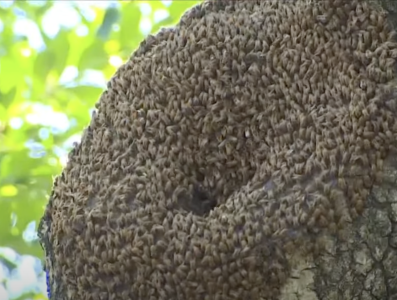Are "Killer Bees" heading for your neighborhood? Here’s what you need to know to stay safe
By
Veronica E.
- Replies 0
It might sound like something out of a suspense movie, but the threat of so-called “killer bees” is very real—and it’s getting closer to home.
These aggressive insects, officially known as Africanized honey bees, have been steadily expanding their territory across the United States.
Their presence is growing, and more communities are starting to see the risks firsthand.
At The GrayVine, we believe that staying informed is the first step toward staying safe.
So let’s take a closer look at where these bees came from, why they’re so feared, and what you can do to protect yourself, your family, and your pets.

What are "killer bees"—and why the scary nickname?
Africanized honey bees aren’t a different species, but rather a hybrid of East African lowland honey bees and European honey bees.
They were introduced to Brazil in the 1950s as part of a project to improve honey production.
But in 1957, several queens escaped, and their descendants have since traveled northward through the Americas.
Their venom isn’t stronger than that of regular honey bees—but their behavior is.
Africanized bees are extremely defensive and quick to swarm.
If disturbed, even accidentally, they may attack in large numbers and chase a target for up to a mile.
They can even sting through standard beekeeping suits.
Also read: This couple's wedding day turned into a nightmare–Home destroyed by a guest's unbelievable act!
Where are they now?
These bees have now been reported in at least 13 US states, with high concentrations in Florida, Texas, Arizona, New Mexico, Nevada, and California.
Sightings are becoming more common in Oklahoma, Arkansas, and Utah.
And scientists warn that climate change may soon make conditions favorable for Africanized bees to spread into even more areas, including parts of Oregon, the Great Plains, and the Appalachian region by 2050.
How dangerous are they really?
The danger isn’t in the venom itself, but in the number of stings.
A European honey bee hive may send a few defenders if threatened.
An Africanized hive may send hundreds. In rare but documented cases, victims have received thousands of stings.
One Ohio man survived 20,000 stings in 2022—but only after being placed in a medically induced coma.
The highest risk is for people or animals who cannot escape quickly, such as children, seniors, pets on leashes, or workers using heavy machinery.
Also read: A simple yogurt add-in could do wonders for your gut—here’s what to know
Why so aggressive?
Africanized bees evolved to survive harsh environments and predators in Africa.
Their “attack first” instinct is a form of self-preservation.
Loud noises, strong scents, or vibrations—like from a lawnmower—can all trigger a swarm.
To the bees, you’re just another potential predator.
But that also means they don’t distinguish between humans, pets, or livestock when they feel threatened.
Also read: A creeping invasion is turning roads into hazards—and it’s not a storm
How did they end up in the US?
It started as a well-meaning effort to boost honey production.
Brazilian scientist Warwick Kerr imported African bees in 1956.
A year later, 26 queens escaped into the wild.
By 1990, the bees had made it to Texas, and they’ve continued spreading ever since.
Also read: An invasive insect is making its way through 19 US states—is your hometown in danger?
Is there any upside to these bees?
Surprisingly, yes.
Africanized honey bees are more resistant to certain pests and diseases that plague other bee populations.
They’re also highly productive.
With proper breeding and careful management, researchers hope to harness these strengths while minimizing their dangers.
Since honey bees are essential to our food supply, any genetic diversity that improves their health can be a silver lining.
Also read: Brace yourself: Alien-like insect set to invade 13 states after 17 Years!
What to do if you encounter aggressive bees
If you stumble upon a hive or find yourself under attack, run.
Don’t swat, don’t hide underwater (they’ll wait), and don’t try to remove the hive yourself.
Cover your face, especially your mouth and nose, and get to shelter.
If you own pets or livestock, give them access to shaded or enclosed areas.
Never tether them in open yards where wild hives may be present.
Tips for staying safe
At The GrayVine, we believe staying informed is the first step toward staying safe.
While “killer bees” may sound alarming, a little knowledge and caution can go a long way.
Whether you’re out gardening, walking your dog, or just enjoying the sunshine, being aware of your surroundings can help protect you and those you care about.
Read next: New virus discovery in uncharted region causes future pandemic concerns–Protect yourself now!

No need to panic—but awareness can save lives. Africanized honey bees are here to stay, but with the right precautions, we can coexist. Have you encountered aggressive bees or have tips to share? Join the conversation in the comments. The more we share, the safer we all become.
These aggressive insects, officially known as Africanized honey bees, have been steadily expanding their territory across the United States.
Their presence is growing, and more communities are starting to see the risks firsthand.
At The GrayVine, we believe that staying informed is the first step toward staying safe.
So let’s take a closer look at where these bees came from, why they’re so feared, and what you can do to protect yourself, your family, and your pets.

Africanized honey bees—often called "killer bees"—are expanding their range in the US, raising concerns about safety and awareness in more communities. Image Source: YouTube / KHOU 11.
What are "killer bees"—and why the scary nickname?
Africanized honey bees aren’t a different species, but rather a hybrid of East African lowland honey bees and European honey bees.
They were introduced to Brazil in the 1950s as part of a project to improve honey production.
But in 1957, several queens escaped, and their descendants have since traveled northward through the Americas.
Their venom isn’t stronger than that of regular honey bees—but their behavior is.
Africanized bees are extremely defensive and quick to swarm.
If disturbed, even accidentally, they may attack in large numbers and chase a target for up to a mile.
They can even sting through standard beekeeping suits.
Also read: This couple's wedding day turned into a nightmare–Home destroyed by a guest's unbelievable act!
Where are they now?
These bees have now been reported in at least 13 US states, with high concentrations in Florida, Texas, Arizona, New Mexico, Nevada, and California.
Sightings are becoming more common in Oklahoma, Arkansas, and Utah.
And scientists warn that climate change may soon make conditions favorable for Africanized bees to spread into even more areas, including parts of Oregon, the Great Plains, and the Appalachian region by 2050.
How dangerous are they really?
The danger isn’t in the venom itself, but in the number of stings.
A European honey bee hive may send a few defenders if threatened.
An Africanized hive may send hundreds. In rare but documented cases, victims have received thousands of stings.
One Ohio man survived 20,000 stings in 2022—but only after being placed in a medically induced coma.
The highest risk is for people or animals who cannot escape quickly, such as children, seniors, pets on leashes, or workers using heavy machinery.
Also read: A simple yogurt add-in could do wonders for your gut—here’s what to know
Why so aggressive?
Africanized bees evolved to survive harsh environments and predators in Africa.
Their “attack first” instinct is a form of self-preservation.
Loud noises, strong scents, or vibrations—like from a lawnmower—can all trigger a swarm.
To the bees, you’re just another potential predator.
But that also means they don’t distinguish between humans, pets, or livestock when they feel threatened.
Also read: A creeping invasion is turning roads into hazards—and it’s not a storm
How did they end up in the US?
It started as a well-meaning effort to boost honey production.
Brazilian scientist Warwick Kerr imported African bees in 1956.
A year later, 26 queens escaped into the wild.
By 1990, the bees had made it to Texas, and they’ve continued spreading ever since.
Also read: An invasive insect is making its way through 19 US states—is your hometown in danger?
Is there any upside to these bees?
Surprisingly, yes.
Africanized honey bees are more resistant to certain pests and diseases that plague other bee populations.
They’re also highly productive.
With proper breeding and careful management, researchers hope to harness these strengths while minimizing their dangers.
Since honey bees are essential to our food supply, any genetic diversity that improves their health can be a silver lining.
Also read: Brace yourself: Alien-like insect set to invade 13 states after 17 Years!
What to do if you encounter aggressive bees
If you stumble upon a hive or find yourself under attack, run.
Don’t swat, don’t hide underwater (they’ll wait), and don’t try to remove the hive yourself.
Cover your face, especially your mouth and nose, and get to shelter.
If you own pets or livestock, give them access to shaded or enclosed areas.
Never tether them in open yards where wild hives may be present.
Tips for staying safe
- Stay informed: Check local news or agricultural agencies to see if killer bees are active in your area.
- Be alert outdoors: Especially when mowing, pruning, or clearing brush. Buzzing sounds or visible swarms are signs to move away.
- Secure animals: Ensure pets can move freely and escape danger.
- Call professionals: If you find a wild hive, don’t attempt removal. Trained experts have the gear and skills to relocate bees safely.
- Educate your community: Talk to neighbors, especially children and seniors, about staying safe.
At The GrayVine, we believe staying informed is the first step toward staying safe.
While “killer bees” may sound alarming, a little knowledge and caution can go a long way.
Whether you’re out gardening, walking your dog, or just enjoying the sunshine, being aware of your surroundings can help protect you and those you care about.
Read next: New virus discovery in uncharted region causes future pandemic concerns–Protect yourself now!
Key Takeaways
- Africanized honey bees, known as “killer bees,” are spreading across southern and southwestern US states and may expand northward due to climate change.
- Though their venom is not more toxic, their aggressive swarming behavior makes them more dangerous—attacking in large numbers and chasing threats for up to a mile.
- Most serious injuries or deaths occur when people or animals are unable to escape quickly, especially in areas where hives are disturbed unintentionally.
- Despite their aggression, Africanized bees are resilient, disease-resistant, and highly productive—traits scientists are exploring to support global bee health if properly managed.
No need to panic—but awareness can save lives. Africanized honey bees are here to stay, but with the right precautions, we can coexist. Have you encountered aggressive bees or have tips to share? Join the conversation in the comments. The more we share, the safer we all become.






